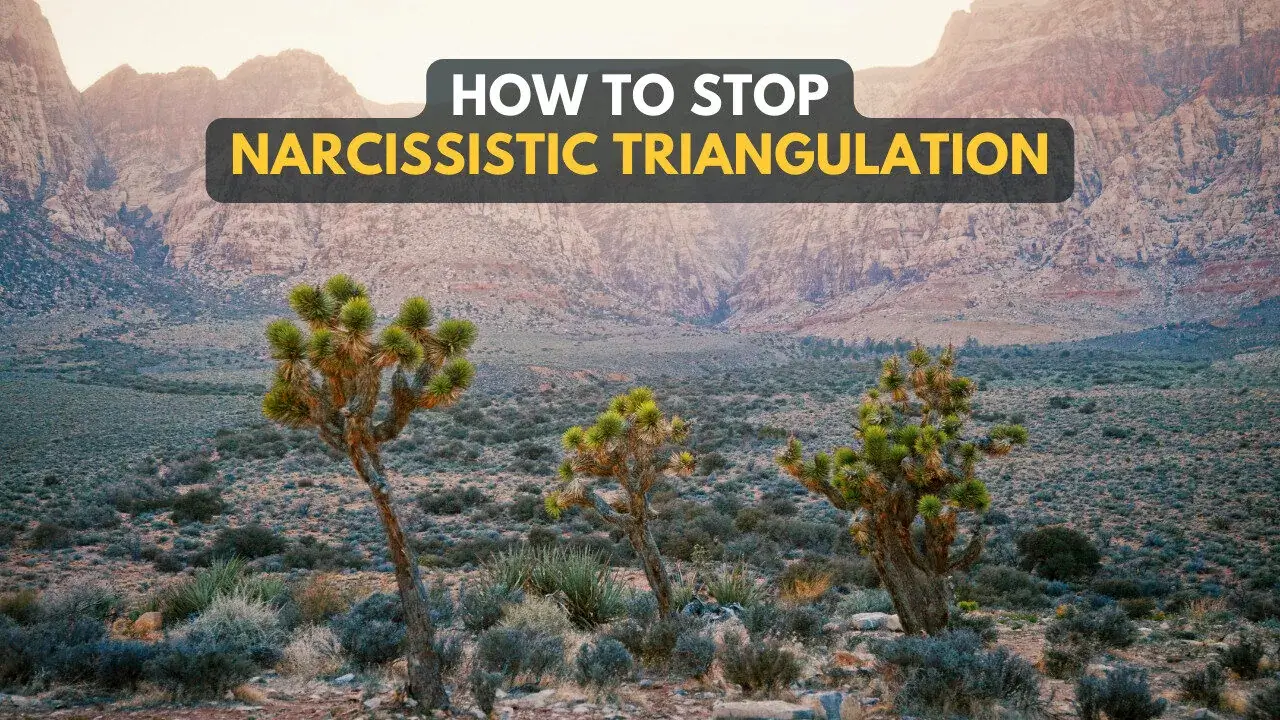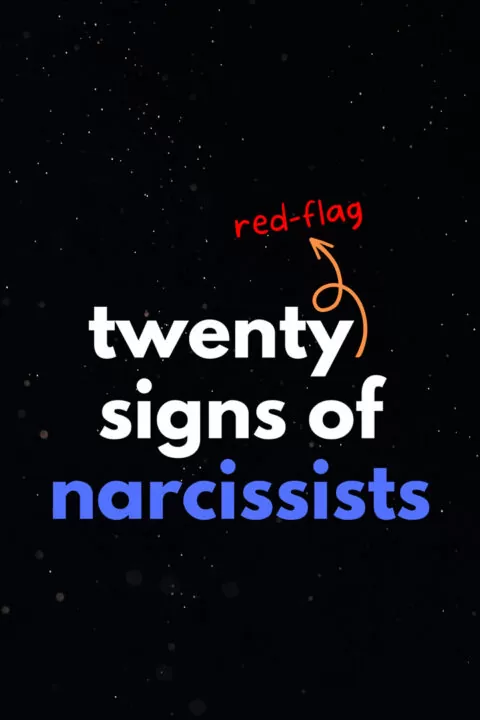Triangulation is introducing a third person into your relationship. When the narcissist you are related to does it, it is narcissistic triangulation.
Narcissistic triangulation is emotional abuse, by any standard. And prevention is better than cure.
Learning how to avoid triangulation may be a better bet than dealing with it once it has begun. So, educate yourself on narcissism and narcissistic Personality Disorder (NPD).
How To Stop Narcissist Triangulation
Narcissists triangulate to gain ultimate control over you. In fact, they are obsessed with controlling other people in their lives.
Here is how to stop triangulation by a narcissist:
1. Identify & Confirm Narcissistic Triangulation Early.
This one is obvious: the sooner you spot it, the sooner you try to figure out how to react to narcissist triangulation.
It is crucial that you spot this manipulation early on.
Being even vaguely aware that they may be triangulating can nudge you to investigate the situation closely.
Start observing their words to find out if they are using a third-person’s reference to put you down.
Notice if they are guilt-tripping you by repeatedly bringing up how someone else gives them better care and more love than you.
Guilt-tripping plants shame and guilt in you for things that aren’t your fault, or makes you feel as if you’ve let people down.
Pick up the cues that they are planning to introduce the triangulating person into your relationship. Take note if they are “thinking loudly” about inviting a friend over for dinner or asking if you would like to meet that person for dinner outside.
Of course, when they bring that third person home, they will most likely share your relationship issues with them. They may tell them (the rescuer) about your faults and the reasons they are unhappy because of you.
Identifying and confirming the specifics of triangulation will help to ease your feelings of guilt. You see that they are problematic, not you.

Once you see triangulation, stop playing victim, stop blaming yourself, and stop trying to fix the relationship.
2. Reach Out To The Third Person (The Rescuer)
Narcissist triangulation creates the drama triangle, with the victim, the persecutor, and the rescuer on three corners.
The third person is often called the rescuer as they are supposedly brought in by the narcissist to rescue them and the relationship.
Actively seek opportunities to reach out to the third person and talk with them.
Tell them what the narcissist has told you about them. Ask that they share with you their impression of you based on the narcissist’s version.
A narcissist will often triangulate you with someone who is more powerful than you. Then the narcissist stands back and watches the authoritarian figure beat you into submission.
In any case, your goals are to know each other better, clarify your stand to the other person, and work through your misunderstandings.
Take the time to explain why their presence isn’t helping, and emphasize your role in the partnership.
Be cautious, however, that it could be dangerous reaching out to a third person to discuss your issues, as it may unmask the narcissist.
And that may cause the narcissist to explode in a typical narcissistic rage.
3. Make The Narcissist Agree To Your Boundaries
Healthy boundaries are crucial in each and every relationship. But narcissists are notorious for breaching your boundaries and violating your personal space.
If you are working in the same office, or parenting children with them, strictly set these six boundaries with them.
Make them know about your boundaries and get them to agree to honor them.
It is critical to get them to agree (possibly in writing) to respect your boundaries since they usually find it tough to retract from their commitments.
Let at least some people around know about the boundaries you have set for them. This is also necessary as narcissists are wary of losing public respect, and will be less likely to break through your boundaries.
4. Break Up With The Narcissist Fully And Finally
Most counselors specializing in narcissism suggest that going “No Contact” with the narcissist is the best way to deal with their narcissistic abuse.
Breaking off all contact with them is the decisive step toward putting an end to narcissistic triangulation and all other forms of narcissistic abuse. A temporary time away from each other will not work; only a clean cut.
Write them a letter/email:
I’m writing to let you know that our relationship has come to an end. I feel we must not have any further contact.
I believe it is in our best interests to go our separate ways and focus on our own growth and happiness.
Since we are not going to meet again, I want to thank you for the times and experiences we shared.
Please understand that this decision does not need any discussion, and it is a decision I am making for myself.
Goodbye and have a great life!
To keep your future safe from the narcissist’s reach, block them once you cut the relationship.
Prevent them from contacting you in any way, including phone calls, messaging, social media, messengers, and even common friends.
Stop any future chance meetings with them. Avoid going to places where they are likely to be. Try to minimize your interactions with mutual friends when you split up with the narcissist.
Involve the police if they stalk you.
The surest and safest way to stop a narcissist from triangulating is to exit the toxic relationship.
When caught up in a drama triangle, your wisest course of action is to remove your angle from the triangle.
Three questions remain: what are the root causes of narcissist triangulation, what are the signs that they have launched it, and why must you stop it?
Why Do Narcissists Triangulate
The narcissist introduces the rescuer to make the victim feel insecure and jealous. As the victim feels competed against, they become even more desperate to cling to the narcissist.
The narcissist will also gaslight the victim while triangulating.
The idea is to make them feel bad about how others perceive them. This turns the victim distrustful of any person other than the narcissist. Those other persons could be an ex-partner, family, friends, colleagues, or their counselors.
Narcissists often triangulate their children. They put the child in a dilemma by asking to name their preferred parent.,
“Who loves you more, mama or papa? Who do you prefer to spend your time with?”
– A narcissist parent
A healthy child loves both parents and wants the love of both parents.
However, when a child is forced to express a preference for one parent, the child is turned into a prize to be won in the spousal struggle.
In response to divorce, the narcissistic personality parent will frequently use psychological manipulation to “triangulate” the child into the spousal conflict.
They will attempt to control the child’s “thoughts, feelings, and relationship to parents” in order to fix the failing psychological structure of the narcissistic parent (C. A. Childress, 2016).
How do narcissists react when they can’t control you?
Signs of Narcissistic Triangulation
Narcissistic triangulations can be difficult to spot at first.
You are so perplexed and insecure that you do not notice that they are doing it deliberately. However, the narcissist always makes sure that you know what’s happening.
Here are some tell-tale signs that can help you identify if they are triangulating you:
- Narcissistic triangulation involves the narcissist using another person to make you feel unstable and insecure in the relationship. They may openly flirt with others to make you jealous.
- They might show up late for dates or not show up at all, and not explain it. It makes you suspect that there is someone they went to meet. But they won’t confirm or deny it.
- They might start ignoring friends and family, and would not explain why. They make it a point to wait till you declare your intentions to go somewhere with them. Then they tell you that they are not available on that date.
- They will try to make themselves seem more desirable by making it appear as if they have a lot of potential or showing their good side to the other person.
- They might be angry, irritable, or secretive, and hide things from you. This is often a thinly veiled attempt – they make sure you notice that they are hiding things from you increasingly.
- They might have a sudden change in personality and become distant from you. It could be an elaborate show, beginning with them caring about you on a certain day, like your birthday. Then, by evening, they suddenly become distant and even leave at short notice.
- You might notice they are always busy with their phones while at home. They take their mobiles to the washroom, and, if they had forgotten their phone at home, they may even drive back halfway from the office to retrieve it.
- Of course, they always keep their phones, safes, and drawers locked, and never reveal the passcodes.
Why you must stop narcissistic triangulation?
Narcissistic triangulation must be stopped immediately because it can make the victim feel confused, unwanted, competitive, more servile to the narcissist abuser, and even planning to harm them.
When the narcissist triangulates your relationship, be well aware that they are purposefully trying to instill jealousy and insecurity in you.
Victims of narcissistic triangulation often feel betrayed and isolated. They may also be made to believe that they themselves are the source of their problems.
Further Reading:
- Children’s Triangulation during Inter-Parental Conflict: Which Role for Maternal and Paternal Parenting Stress? – Elena Camisasca, Sarah Miragoli & Paola Di Blasio, 2019
- Coparenting, Parenting Stress, and Authoritative Parenting among Hong Kong Chinese Mothers and Fathers – Eva Yi Hung Lau & Thomas G. Power, 2019
- Is Parent-Initiated Triangulation Associated with Pathological Narcissism in Youth? – LM Lee-Rowland, 2019
- “Now I Can See Things for What They Are”: The Experiences of Adult Children of Narcissists – Komal Jagasia, Peter Saunders & Louise Roufeil, 2022
Final Words
The main aim of all narcissistic abuse is to maintain power and sadistic joy while keeping the victim confused and disturbed.
If you’re in a relationship with a narcissist, do not ignore their triangulation while it is still early so that it does not ruin your sanity.
Simply remove your angle from the triangle.
Reach out to friends and family who support you.
Even if you have no one to turn to, leave them and go solo. Most narcissist abuse survivors hold that being alone is far better than being with a narcissist.
Take the help of mental health professional whenever you feel you cannot handle it.
• • •
- How Do Narcissists React When They Can’t Control You?
- How To Stop A Narcissist Affair, Break The Spell, & Move On?
• • •
Author Bio: Written and reviewed by Sandip Roy — medical doctor, psychology writer, and happiness researcher. Founder and Chief Editor of The Happiness Blog. Writes on mental well-being, happiness, positive psychology, and philosophy (especially Stoicism).
√ If you liked it, please spread the word.
